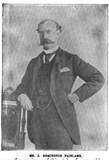Planning worship?
Check out our sister site, ZeteoSearch.org,
for 20+ additional resources related to your search.
- |
User Links
Person Results
Charles H. Webb
b. 1933 Person Name: Charles H. Webb Composer (descant) of "TALLIS' CANON" in The United Methodist Hymnal Music Supplement
Charles H. Webb
H. Ellis Wooldridge
1845 - 1917 Person Name: H. E. W. Arranger of "[Glory to Thee, my God, this night]" in Hymns b. 3/28/1845, Winchester; d. 2/13/17, London; English music scholar
LOC Name Authority File
H. Ellis Wooldridge
Flossette Du Pasquier
Translator (French) of "All praise to Thee, my God, this night" in Cantate Domino
Flossette Du Pasquier
Erwin Kleine
Translator (German) of "All praise to Thee, my God, this night" in Cantate Domino
Erwin Kleine
Louis Bourgeois
1510 - 1561 Composer of "OLD HUNDRETH" in The Hymnal and Order of Service Louis Bourgeois (b. Paris, France, c. 1510; d. Paris, 1561). In both his early and later years Bourgeois wrote French songs to entertain the rich, but in the history of church music he is known especially for his contribution to the Genevan Psalter. Apparently moving to Geneva in 1541, the same year John Calvin returned to Geneva from Strasbourg, Bourgeois served as cantor and master of the choristers at both St. Pierre and St. Gervais, which is to say he was music director there under the pastoral leadership of Calvin. Bourgeois used the choristers to teach the new psalm tunes to the congregation.
The extent of Bourgeois's involvement in the Genevan Psalter is a matter of scholarly debate. Calvin had published several partial psalters, including one in Strasbourg in 1539 and another in Geneva in 1542, with melodies by unknown composers. In 1551 another French psalter appeared in Geneva, Eighty-three Psalms of David, with texts by Marot and de Beze, and with most of the melodies by Bourgeois, who supplied thirty four original tunes and thirty-six revisions of older tunes. This edition was republished repeatedly, and later Bourgeois's tunes were incorporated into the complete Genevan Psalter (1562). However, his revision of some older tunes was not uniformly appreciated by those who were familiar with the original versions; he was actually imprisoned overnight for some of his musical arrangements but freed after Calvin's intervention. In addition to his contribution to the 1551 Psalter, Bourgeois produced a four-part harmonization of fifty psalms, published in Lyons (1547, enlarged 1554), and wrote a textbook on singing and sight-reading, La Droit Chemin de Musique (1550). He left Geneva in 1552 and lived in Lyons and Paris for the remainder of his life.
Bert Polman
Louis Bourgeois
J. Remington Fairlamb

1838 - 1908 Person Name: J. R. Fairlamb Composer of "[Glory to Thee, my God, this night]" in Songs of Worship Mr. J. Remington Fairlamb received his first musical instruction at the hands of his mother. Although he was exceedingly fond of his music, while very young he was more fond of “dreaming” than of “practicing” at the piano. But at the age of twelve the boy came across a copy of Spohr’s oratorio ”The Last Judgment,” which seems to have satisfied his craving and shaped his career. When fourteen years of age he obtained a position as organist of the Western Methodist church, the first of its denomination in Philadelphia to obtain an organ. He afterwards filled the same position in the Tabernacle Baptist Church and succeeded one of the best church musicians of that city as organist and choir master of the Clinton Street Presbyterian church. During his twentieth year Mr. Fairlamb went to Europe and studied first in Paris, the piano under Marmoutel, voice under Masset, and harmony under Danhauser; subsequently he continued his studies under Mabellin in Florence Italy. Returning to America about the outbreak of the Civil War, and being incapacitated for military service by defective eyesight, Mr. Fairlamb accepted the position of Musical Director of the Church of the Epiphany in Washington, D.C. Here he enjoyed the acquaintance of many notable people, including President and Mrs. Lincoln. Being appointed United States consul at Zurich in Switzerland by Mr. Lincoln, he returned to Europe and remained there four years. His compositions number about two hundred in all. His music is distinguishable by dramatic intensity and orchestral ideas. He has published a part of a romantic opera, “Valeri,” and a quartet opera, “Love’s Stratagem.” His songs published in “St. Nicholas Songs” and “Harper’s Young People,” are so simple, quaint and delicate that, says a prominent New York contralto, he would live had he composed nothing else, forever in these.” His “Cradle Song” is a worthy specimen of this style of composition. Mr. Fairlamb has charge of societies in Newburgh, Hudson and Catskill.
from The World's Best Music: Famous Songs and Those who Made Them Famous, Volume 1
By Frederic Dean, Reginald De Koven, Gerrit Smith
J. Remington Fairlamb
Jacob M. Showalter
Person Name: J. M. Showalter Composer of "LINDALE" in The Brethren Hymnal
Jacob M. Showalter
Heinrich Christoph Zeuner
Composer of "MISSIONARY CHANT" in The Harvard University Hymn Book See Zeuner, Charles, 1795-1857
Heinrich Christoph Zeuner


 My Starred Hymns
My Starred Hymns

